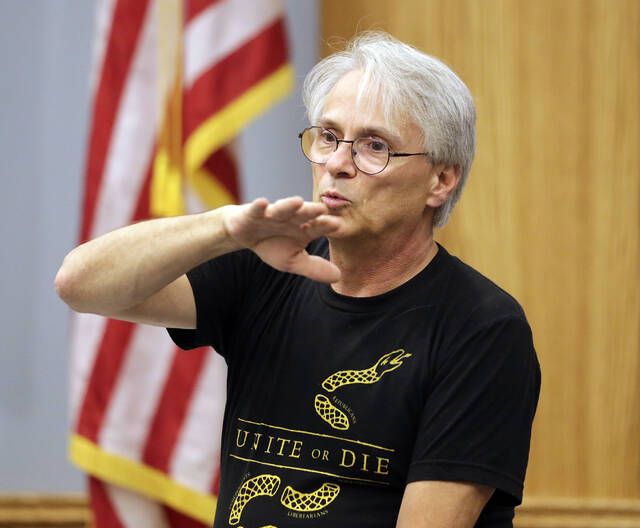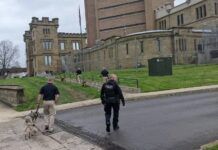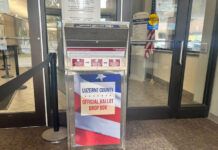Poll worker and former Luzerne County election board member Peter Ouellette is expressing concerns about a planned switch from electronic to paper poll books for voter sign-in at election polling places Nov. 8.
County Deputy Election Director Beth McBride said the change was carefully weighed, even before her hiring to the position in July, and stressed protocols are in place to ensure all voters are properly tracked.
Ouellette, of Pittston, said a crucial issue will be making sure poll workers know which voters requested mail ballots so they are not mistakenly allowed to cast a second ballot on voting machines at polling places.
Mail ballot voters must use paper provisional ballots if they appear at the polls unless they bring in their unreturned mail ballot and associated envelopes to be voided. Provisional ballots are segregated and reviewed last so the election board can verify no mail ballots were received from these voters.
Electronic poll books are programmed with data identifying voters who requested mail ballots. These devices must be programmed before the state deadline to request mail ballots, which falls a week before elections. As a result, the county must generate a supplemental list of voters who requested mail ballots after the machines were programmed. Poll workers manually enter the additional names into the electronic poll books the morning of the election, before the polls open.
Ouellette worries the paper poll books would have to be printed even earlier to be ready in time, causing the supplemental list of mail ballot requests to grow too long for them to be manually added to the paper books.
McBride said she has been informed the paper poll book printing will be completed on or around the same time the electronic poll books would have been programmed, which means the supplemental list would be the same size either way.
As with the electronic version, the paper poll books will clearly identify voters who requested mail ballots up to the time the books are printed, she said. Instead of manually entering the supplemental list into the electronic poll books, poll workers must mark that information next to the names of those voters in the paper poll books, McBride said.
While smaller in scope, McBride said it is important to note paper poll books were successfully used here in the April 6 special election for state representative in the 116th Legislative District.
Poll worker training
McBride announced the change to paper books during last week’s election board meeting, saying it would be a test and not necessarily a permanent decision for future elections.
Election Bureau Operations Manager Emily Cook has said a review of data from the last few elections determined the majority of Election Day calls from poll workers involved issues getting the electronic poll books to work, despite training and a written instructional guide.
“A lot of times if they can’t get them to work, they kind of panic, and it spirals from there into a larger issue,” McBride said.
Ouellette questioned if poll workers will be trained on the return to paper books, saying electronic poll books have been used in all countywide elections since Pennsylvania started permitting the option to vote by mail with no excuse or justification required in 2020.
The county purchased the poll books for $325,000 in 2018, with the promise the equipment would speed up and improve the processing of voters as they enter polling places. Voters sign in with a stylus on a tablet.
Ouellette predicted voter check-in will be slower with the paper books and warned the county encountered issues in the past with paper poll books that were misprinted or delivered to the wrong locations.
McBride said instructions on the paper poll books will be covered in training and through materials provided to poll workers. Extensive proofing already has been identified as a top priority, she said.
She disagreed that electronic poll books have accelerated voter processing, saying her experience has been different as a voter.
“It seemed like there was less confusion for poll workers and voters with the paper poll books,” she said, noting opinions vary. “Each voter and poll worker may have an easier time using one over the other.”
Ouellette also praised the electronic poll books for allowing poll workers to instantly search and redirect voters who show up at the wrong polling place.
“Printed books offer the poll worker no such information. This will inevitably lead to possibly ugly arguments and abuse of poll workers and inadvertent disenfranchisement of discouraged voters,” Ouellette said.
McBride said the administration will fully staff an office hotline to promptly assist poll workers with inquiries about voters at the wrong polling place.
Smooth election
Ouellette emphasized he is not personally criticizing or attacking McBride or the election bureau and is raising questions publicly because he genuinely wants to avoid problems.
“There are people looking to prove there is fraud in elections. You don’t want to hand them a way to do it,” he said.
McBride said the decision to halt electronic poll books stems from the bureau’s methodical efforts to plan ahead and address issues that have cropped up in the past.
“If we can alleviate one concern for poll workers, that is a positive thing,” McBride said.
Reach Jennifer Learn-Andes at 570-991-6388 or on Twitter @TLJenLearnAndes.





